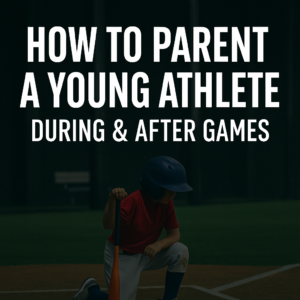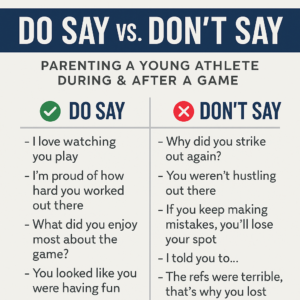How to Parent a Young Athlete During & After Games | R3 Athlete Performance
 The Best Way to Parent an Athlete During and After a Game
The Best Way to Parent an Athlete During and After a Game
As a parent, one of the greatest joys is watching your child compete in sports. Baseball, softball, soccer, basketball — no matter the game, the experience of cheering from the sidelines is special. But what parents say during and after games can make a huge difference in how athletes feel about themselves, their performance, and the sport they play.
Too often, well-meaning parents provide feedback that feels more like criticism, leaving young athletes discouraged instead of motivated. This blog provides evidence-based guidance on how parents can best support their athletes — and what to avoid.
Why Words Matter
Research in child psychology and sports development shows that criticism from parents, especially right after games, increases anxiety and decreases confidence. Instead of learning from mistakes, athletes feel judged. Over time, this can lead to:
-
Loss of love for the sport
-
Increased stress before games
-
Fear of failure instead of willingness to improve
On the flip side, positive reinforcement and supportive communication foster resilience, confidence, and long-term growth. Kids who feel encouraged are more likely to stay in sports, enjoy the process, and push themselves to improve.
What Parents Should Not Say During or After Games
Here are common phrases to avoid, and why they’re harmful:
-
❌ “Why did you strike out again?” – Creates shame instead of teaching.
-
❌ “You weren’t hustling out there.” – Makes effort feel undervalued.
-
❌ “If you keep making mistakes, you’ll lose your spot.” – Builds fear and anxiety.
-
❌ “I told you to…” – Takes away ownership and independence.
-
❌ “The refs were terrible, that’s why you lost.” – Teaches blame instead of accountability.
Even when parents think they’re motivating, these statements often damage confidence and turn the ride home into the most dreaded part of the day.
What Parents Should Say During or After Games
Instead, focus on support, encouragement, and letting coaches handle corrections. Examples include:
-
✅ “I love watching you play.”
-
✅ “I’m proud of how hard you worked out there.”
-
✅ “What did you enjoy most about the game?”
-
✅ “You looked like you were having fun.”
-
✅ “I can see how much you’re improving.”
These statements shift the focus from results to effort, enjoyment, and growth. They show unconditional support — which is what kids need most from their parents.
 Evidence on Sideline Behavior
Evidence on Sideline Behavior
Studies in sports psychology confirm that athletes perform better when parents stay positive and avoid coaching from the stands. Yelling instructions or critiques during the game:
-
Confuses the athlete, especially if it contradicts the coach’s directions.
-
Distracts them from staying present.
-
Adds unnecessary pressure.
The most effective sideline parenting is simple: cheer, clap, and encourage. Kids need space to think, compete, and grow without added stress.
The Role of Parents in Athlete Development
Your role as a parent is not to be the coach — it’s to be the support system. Coaches provide instruction; parents provide belief and encouragement. Together, this balance creates the healthiest environment for growth.
When parents lead with positivity, kids not only perform better but also:
-
Stay in sports longer
-
Develop stronger self-esteem
-
Build resilience and discipline that last a lifetime
Final Thoughts
The next time you’re on the sideline or in the car ride home, remember: your child doesn’t need a critic — they need a cheerleader.
Say less, encourage more, and let them know you’re proud just to watch them play. That’s the best way to help athletes learn, play, and grow.

I can learn a lot from this … thank you for posting!